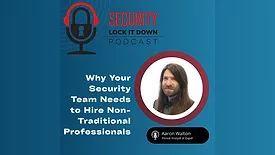Home » cybersecurity training
Articles Tagged with ''cybersecurity training''
Listen to Aaron Walton, Threat Analyst at Expel, in this podcast episode.
Read More
Sign-up to receive top management & result-driven techniques in the industry.
Join over 20,000+ industry leaders who receive our premium content.
SIGN UP TODAY!Copyright ©2026. All Rights Reserved BNP Media.
Design, CMS, Hosting & Web Development :: ePublishing












.webp?height=168&t=1717431590&width=275)


